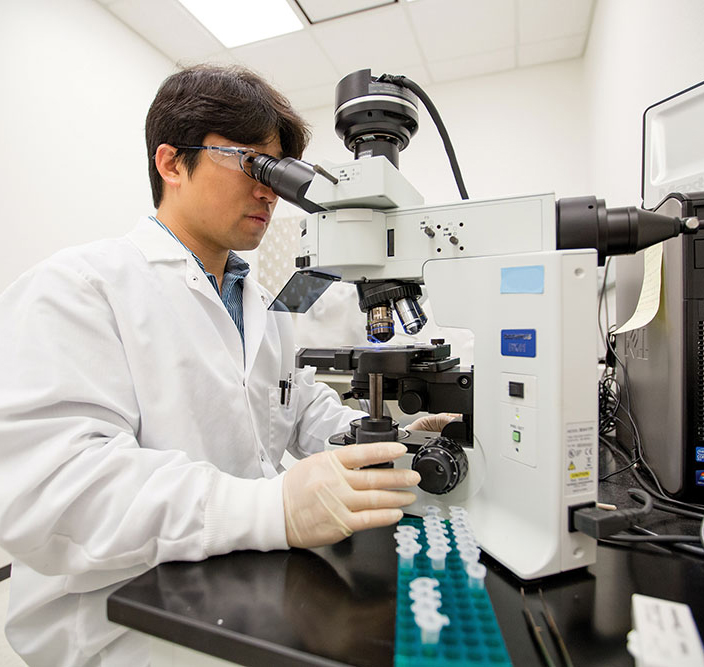Dr. Myoung-Hwan Chi


Dr. Myoung-Hwan Chi holds a Ph.D. in plant microbiology and is a research scientist at the Noble Research Institute. He is a member of the OK NSF EPSCoR Track-1 RII Award titled Socially Sustainable Solutions for Water, Carbon, and Infrastructure Resilience in Oklahoma. The $20 million EPSCoR research project is a social science-led, multi-disciplinary collaboration among social, physical, biological, engineering, and computational scientists. More than thirty researchers from across the state are working together on the project, which began July 1, 2020.
 Dr. Chi manages and leads collaborative group research projects in his role at the Noble Research Institute. Recent projects (2016-present) include:
Dr. Chi manages and leads collaborative group research projects in his role at the Noble Research Institute. Recent projects (2016-present) include:
- Microbial population and grazing animal impact under no-till and cover crop
- Switchgrass sustainability
- Deployment and metagenomics analysis of beneficial switchgrass microbes in a field environment
Dr. Chi's work supports the OK NSF EPSCoR project's Focus Area 2: Terrestrial Water & Carbon Dynamics (TWCD). Specifically, he is responsible for managing a collaborative S3OK research project located in the Red River Farm and Coffey Ranch study sites.
The TWCD focus area is central to the wicked problems facing Oklahoma because of conflicting policy narratives that shape concerns about carbon management and risks associated with landscape management practices (e.g., wildfire risks). At the same time, linkages across the TWCD and other focus areas provide opportunities to engage key stakeholder groups in discussions addressing both problem definition and potentially sustainable solution sets. Land use/carbon cycle issues play this crucial role because of the interactions among terrestrial ecosystems and carbon and water cycling, which are in turn integral components of the other impact domains addressed in this research project.
Photo (above/right): Dr. Myoung-Hwan Chi examines plant tissue samples for the presence of a fungus that may benefit plant growth.
Photo credit: Noble Research Institute https://www.noble.org/news/publications/legacy/2014/winter/fields-of-green/
- Wang, N. R., Melnyk, R. A., Wiesmann, C. L., Hossain, S. S., Chi, M. H., Martens, K. & Haney C. H. 2021. Commensal Pseudomonas fluorescens protect Arabidopsis from closely-related Pseudomonas pathogens in a colonization-dependent manner. mBio. (Accepted)
- Ray, P., Guo, Y., Chi, M. H., Krom, N., Boschiero, C., Watson, B., Huhman, D., Zhao, P., Singan, V. R., Lindquist, E. A., Yan, J., Adam, C., & Craven, K. D. 2021. Serendipita fungi modulate the switchgrass root transcriptome to circumvent host defenses and establish a symbiotic relationship. MPMI. Doi: 10.1094/MPMI-04-21-0084-R.
- Ray, P., Guo, Y., Chi, M. H., Krom, N., Saha, M. C. & Craven, K. D. 2020. Serendipita bescii promotes winter wheat growth and modulates the host root transcriptome under phosphorus and nitrogen starvation. Environmental Microbiology, doi: 10.1111/1462-2920.15242.
- Ray, P., Chi, M. H., Guo, Y., Chen, C., Adam, C., Kuo, A., LaButti, K., Lipzen, A., Barry, K. W., Grigoriev, I. V., Tang, Y. & Craven, K. D. 2018. Genome sequence of the plant growth-promoting fungus Serendipita vermifera subsp. bescii: The first native strain from North America. Phytobiomes Journal, 2 (2), 62-63 https://doi.org/10.1094/PBIOMES-04-17-0017-A.
- Chi, M. H., and Craven, K. D. 2016. RacA-mediated ROS signaling is required for polarized cell differentiation in conidiogenesis of Aspergillus fumigatus. PloS one, 11(2), e0149548.
- Chi, M. H. and Craven, K. D. 2013. Oxygen and an extracellular phase transition independently control central regulatory genes and conidiogenesis in Aspergillus fumigatus. PLoS ONE. 8: e74805.
- Park, S. Y., Choi, J., Lim, S. E., Lee, G. W., Park, J., Kim, Y., Kong, S., Kim, S. Rho, H. S., Jeon, J. Chi, M. H., Kim. S, Khang, C. H., Kang, S. and Lee Y. H. 2013. Global expression profiling of transcription factor genes provides new insights into pathogenicity and stress responses in the rice blast fungus. PLoS Pathogens. 9: e1003350.
- Park, S. Y., Chi, M. H., Milgroom, G. M., Kim, H., Han, S. S., Kang, S and Lee, Y. H. 2010. Genetic stability of Magnaporthe oryzae during successive passages through rice plants and on artificial medium. Plant Pathol. J. 26(4): 313-320.
- Chi, M. H., Park, S. Y., Kim, S. and Lee, Y. H. 2009. A novel pathogenicity gene is required in the rice blast fungus to suppress the basal defenses of the host. PLoS Pathogens. 5: e1000401.
- Chi, M. H., Park, S. Y., Kim, S., Lee, Y. H. 2009. A quick and safe method for fungal DNA extraction. Plant Pathol. J. 25: 108-111.
- Yi, M., Chi, M. H., Khang, C. H., Park, S. Y., Kang, S. Valent, B., and Lee, Y. H. 2009. The ER chaperone LHS1 is involved in asexual development and rice infection by the blast fungus Magnaporthe oryzae. Plant Cell. 21: 681-695.
- Park, S.Y., Jwa, N. S., Chi, M. H., Lee, Y. H. 2009. A fluorescence-based cDNA-AFLP method for identification of differentially expressed genes. Plant Pathol. J. 25: 184-188.
- Kim, S., Park, S. Y., Kim, K. S., Rho, H.S., Chi, M. H. Choi, J., Park, J., Kong, S., Park, J., Goh, J., and Lee, Y. H. 2009. Homeobox transcription factors are required for conidiation and appressorium development in the rice blast fungus Magnaporthe oryzae. PLos Genetics 5: e1000757.
- Jeon, J. Goh, J. Yoo, S. Chi, M. H. Choi, J. Rho, H. S. Park, J. Han, S. S. Kim, B. R. Park, S. Y. Kim, S. and Lee, Y. H. 2008. A putative MAP kinase kinase kinase, MCK1, is required for cell wall integrity and pathogenicity of the rice blast fungus, Magnaporthe oryzae. Mol. Plant Microbe Interact. 21: 525-534.
- Choi, J. Park, J. Jeon, J. Chi, M. H. Goh, J. Yoo, S. Y. Park, J. Jung, K. Kim, H. Park, S. Y. Rho, H. S. Kim, S. Kim, B. R. Han, S. S. Kang, S. and Lee, Y. H. 2007. Genome-wide analysis of T-DNA integration into the chromosomes of Magnaporthe oryzae. Mol. Microbiol. 66: 371-382.
- Jeon, J. Park, S. Y. Chi, M. H. Choi, J. Park, J. Rho, H. S. Kim, S. Goh, J. Yoo, S. Choi, J. Park, J. Y. Yi, M. Yang, S. Kwon, M. J. Han, S. S. Kim, B. R. Khang, C. H. Park, B. Lim, S. E. Jung, K. Kong, S. Karunakaran, M. Oh, H. S. Kim, H. Kim, S. Park, J. Kang, S. Choi, W. B. Kang, S. and Lee, Y. H. 2007. Genome-wide functional analysis of pathogenicity genes in the rice blast fungus. Nat. Genet. 39: 561-565.
